12 mins read
UK Menopause Statistics 2023: Attitudes to Menopause at Work
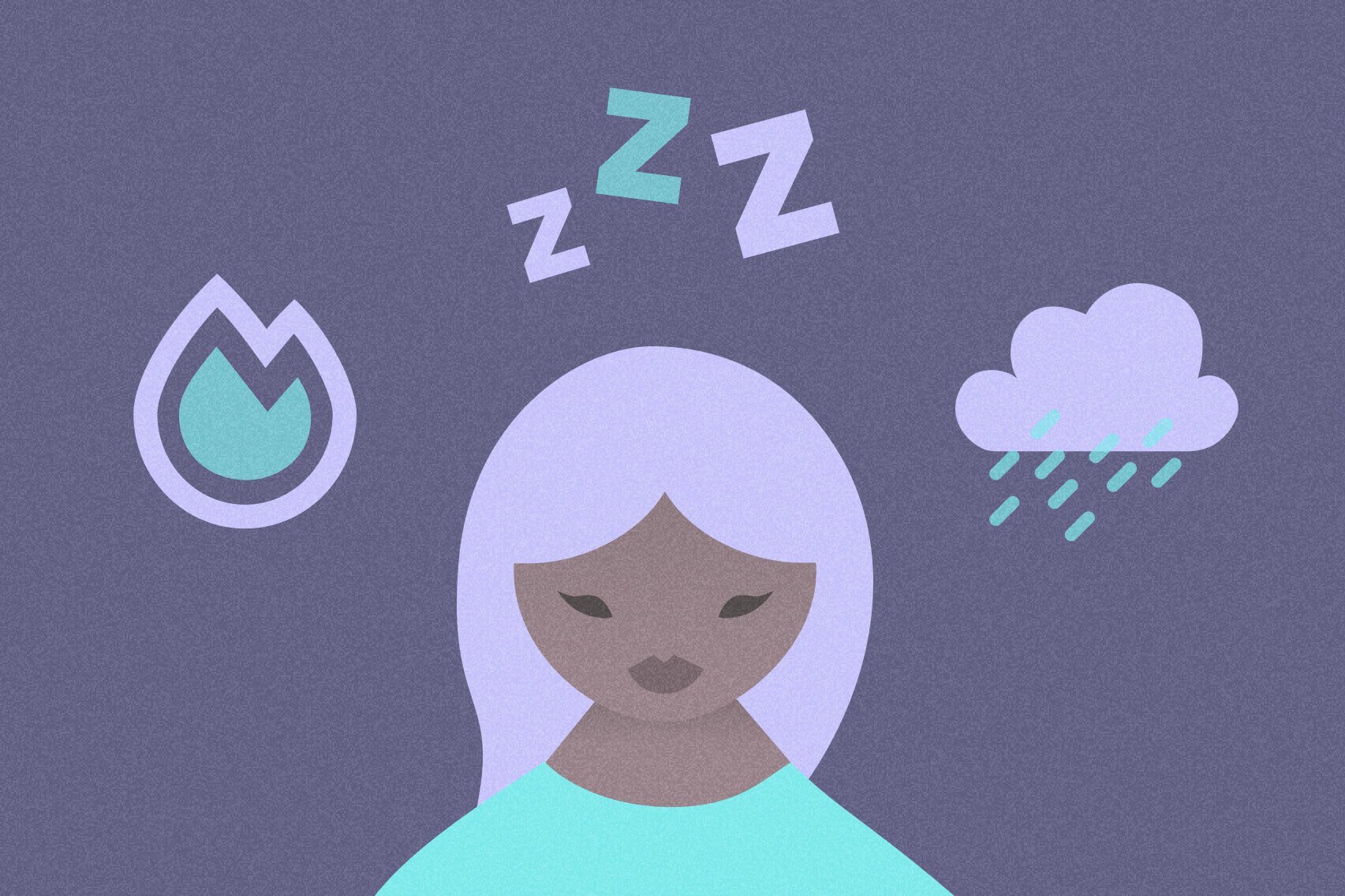
- The Fast Menopause Statistics
- Attitudes to Time off for for Those Experiencing Menopause Symptoms
- Responses by Gender
- Attitudes to Menopause and Sick Leave by Age
- The Current Law
- How Does Menopause Affect Women in the Workplace?
- How Are Employers Supporting Women Going Through the Menopause
- What About Perimenopause? What Symptoms Are Women Experiencing?
- HRT Statistics 2023
- Resources
- Methodology and Caveats
- A Note on the Use of Language
We’ve written about the menopause a lot and carried out lots of research into it before. Given the significant effect it has on those going through it, it’s something we’ll keep researching and writing about, too.
In November 2023, we surveyed 2,005 people in the UK (men and women) to find out about their attitudes towards sick leave from work for people who are experiencing ill health as the result of menopause related symptoms and in January 2024 we surveyed over 2,000 people on whether they thought women face discrimination at work due to menopause.
In addition, we’ve sought out new NHS data and revisited some of our previous research to bring together this comprehensive piece on menopause statistics. Here’s every fact and figures we feel you need.
The Fast Menopause Statistics
You’ll find plenty of detail within our write up but if you just want the fast figures, here are what we consider the key statistics from our menopause research:
- More than 1 in 10 people believe women experiencing symptoms related to the menopause should not be entitled to any sick leave from work
- At the other end of the scale, just over 1 in 4 people in the UK believe that women affected by menopause symptoms should be able to self certify for sick leave for more time than 7 calendar days currently permissible
- 63% of menopausal women say their working life has been negatively affected by symptoms of the menopause
- 90% of workplaces have no formal support for women experiencing menopause
- 94% of menopausal women have experienced menopause symptoms while at work
- The cost to the NHS in September 2023 alone in prescribing HRT was over £16m. This is up 181% in 5 years.
Attitudes to Time off for for Those Experiencing Menopause Symptoms
We commissioned a new survey of 2,005 people aged 16 and over in the UK in November 2023. We worked with a market research company to provide a demographically representative sample. We put a single question to them about their attitudes to time off for those who are ill as the result of menopause.
We asked:
“Which one of the following, if any, best describes your view on menopause and sick leave? (Please tick one)“
We then gave a number of answer options:
- People experiencing menopause should not get any sick leave for symptoms caused by menopause
- People experiencing menopause should only get sick leave when they have symptoms
- People experiencing menopause should get sick leave regardless of whether they have any symptoms
- People experiencing menopause should be able to self certify for additional sick leave (beyond 7 calendar days) whenever they need it
- I don’t know
Here is how people answered in summary:
| Response | Proportion of People Who Gave This Response |
|---|---|
| People experiencing menopause should not get any sick leave for symptoms caused by menopause | 11.37% |
| People experiencing menopause should only get sick leave when they have symptoms | 24.09% |
| People experiencing menopause should get sick leave regardless of whether they have any symptoms | 12.12% |
| People experiencing menopause should be able to self certify for additional sick leave (beyond 7 calendar days) whenever they need it | 25.94% |
| I don’t know | 26.48% |
- More than 1 in 10 people believe that those suffering with symptoms caused by menopause should not get any leave at all.
- At the opposite end of the scale, 12.12% feel those experiencing menopause should be entitled to sick leave whether they’re suffering symptoms or not.
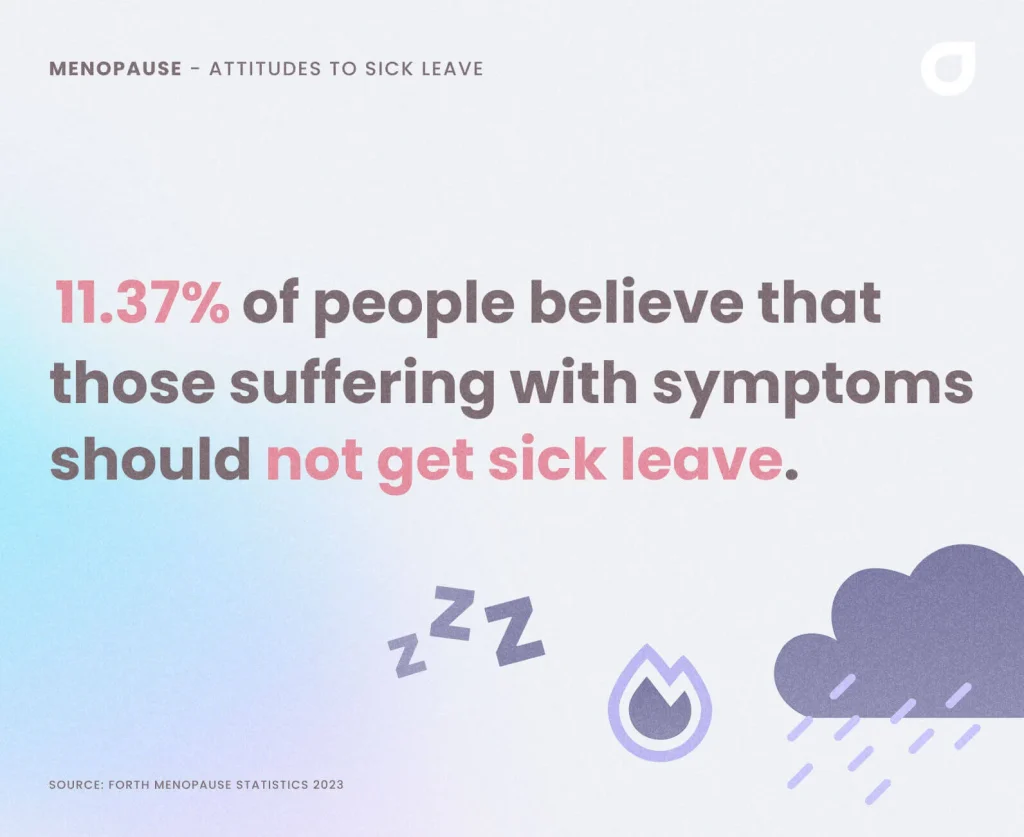
Given the menopause can typically last between 7 and 14 years and women of menopausal age are the fastest growing demographic in the workplace, there may be some practical constraints here!
- Just under a quarter felt, as is most typically the case in workplaces today, that people experiencing the menopause should only have sick leave when they’re experiencing symptoms.
- Over a quarter felt people experiencing menopause should get extra sick leave when they need it and be able to do so through self certification as opposed to having to visit a GP.
- Over a quarter had no opinion.
We’re going to talk about the law itself in a moment and what currently happens in most workplaces. But first we want to dive into our data set in more detail and look at responses to specific demographic groups.
Responses by Gender
We polled both men and women as a part of this survey. We appreciate, of course, that only those assigned female at birth will experience menopause, but the attitudes of male counterparts will often impact the day to day lives of those women who are going through menopause. So we dived into the data in more detail to find out how the responses differed by gender.
Here’s a summary of the statistics:
| Response | Male | Female |
|---|---|---|
| People experiencing menopause should not get any sick leave for symptoms caused by menopause | 12.62% | 10.19% |
| People experiencing menopause should only get sick leave when they have symptoms | 19.69% | 28.25% |
| People experiencing menopause should get sick leave regardless of whether they have any symptoms | 12.31% | 11.94% |
| People experiencing menopause should be able to self certify for additional sick leave (beyond 7 calendar days) whenever they need it | 23.79% | 27.96% |
| I don’t know | 31.59% | 21.65% |
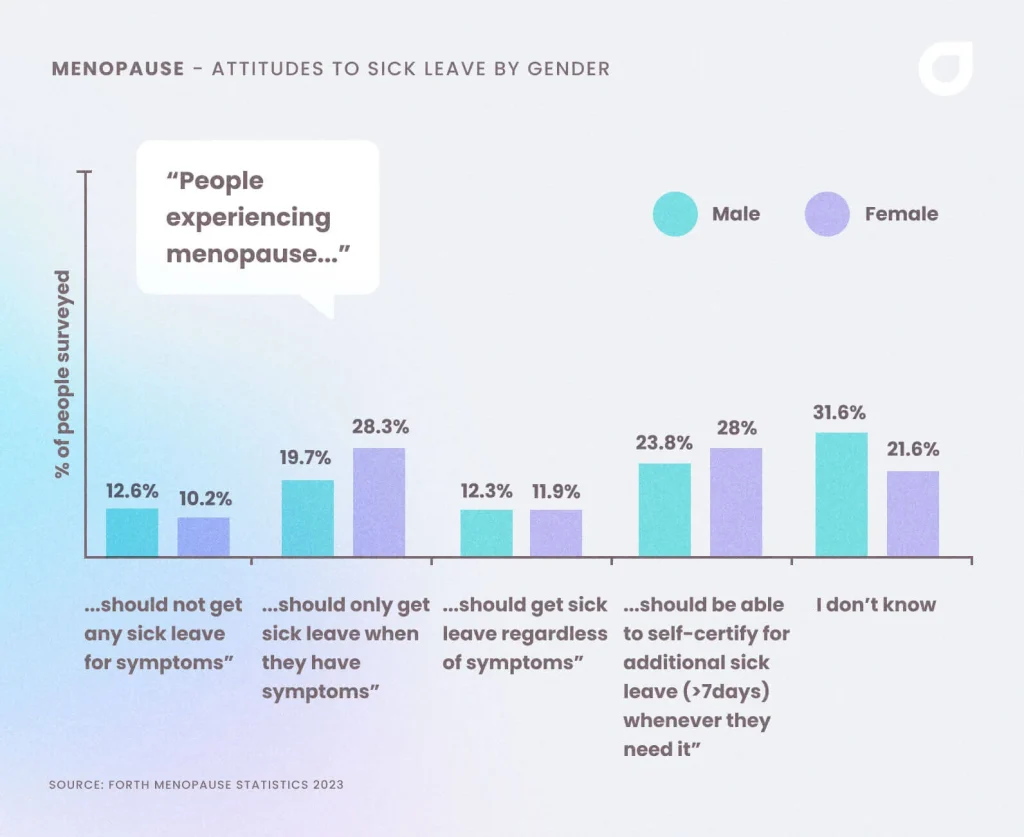
Men were far likelier to say they don’t know than women here. And they were also slightly likelier to say women should not get any time off for menopause even when experiencing symptoms.
The most popular response amongst women is the response most in line with the current situation legally speaking, where they can take time off through standard sick procedures when experiencing symptoms.
But almost as many women feel those experiencing menopause symptoms should be able to extra take time off when needed using self certification (as opposed to visiting a GP).
The opinions of men matter here. We live in a country where, according to 2021 Census data, just under three quarters of the country’s CEOs are male. If more business leaders are men, policies around leave for menopause related symptoms are likely to be influenced by men.
But the biggest variation in responses did not come between genders. Instead, we found the thing most likely to influence responses to our survey question is age.
Attitudes to Menopause and Sick Leave by Age
We broke down responses to our menopause survey by age brackets and found the following:
| Response | 16-24 | 25-35 | 35-44 | 45-54 | 55+ |
|---|---|---|---|---|---|
| People experiencing menopause should not get any sick leave for symptoms caused by menopause | 14.73% | 10.84% | 8.33% | 9.24% | 12.56% |
| People experiencing menopause should only get sick leave when they have symptoms | 18.99% | 22.29% | 24.38% | 24.42% | 26.27% |
| People experiencing menopause should get sick leave regardless of whether they have any symptoms | 24.81% | 18.07% | 14.20% | 8.91% | 5.84% |
| People experiencing menopause should be able to self certify for additional sick leave (beyond 7 calendar days) whenever they need it | 26.74% | 31.63% | 28.40% | 29.37% | 20.94% |
| I don’t know | 14.73% | 17.16% | 24.69% | 28.05% | 34.39% |
- The youngest people are the ones likeliest to believe that no sick leave should be granted to women experiencing menopause symptoms
- Interestingly, the over 55s (those arguably most likely to have experienced menopause or seen a spouse or close family member experience menopause) are the ones most likely not to have an opinion
- 8.3% of those aged 25 to 34 believe no sick leave should be granted for menopause symptoms
- 9.24% of people aged 35 to 44 (the women amongst whom are likely to be approaching or entering menopause) also feel this way
- However, almost a third of those aged 25 to 34 believe more flexible sick leave allowing women experiencing menopause symptoms to self certify for longer than 7 days, should apply
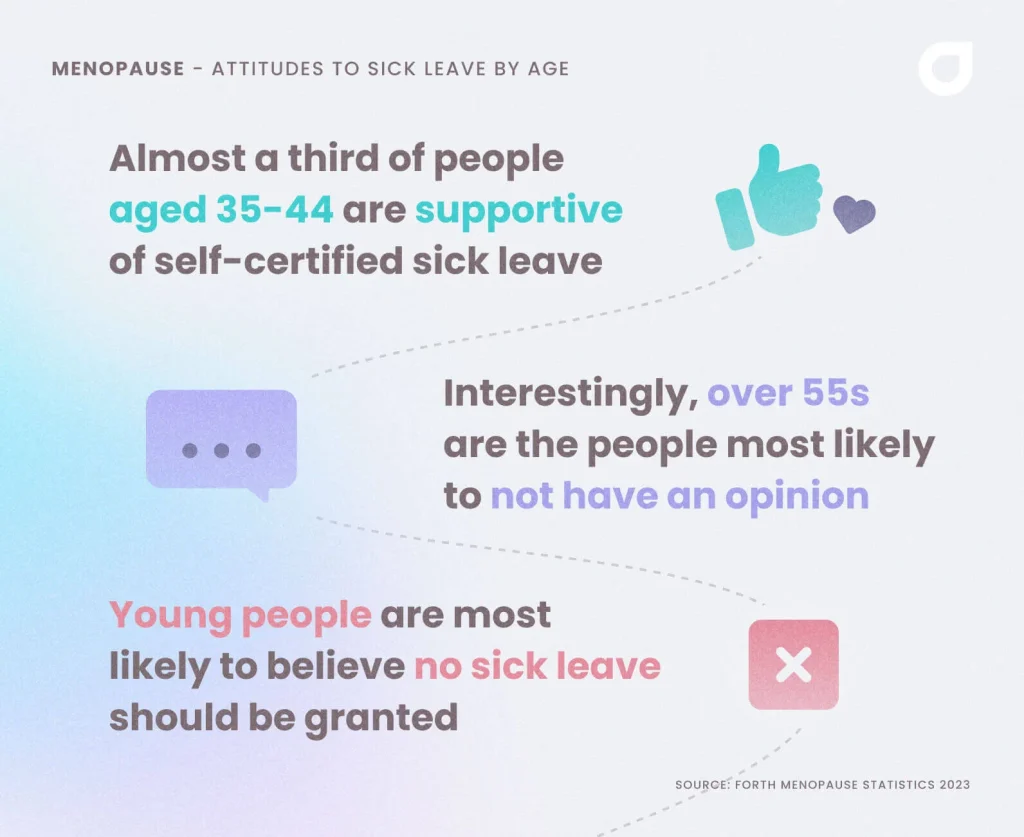
Generally speaking, the youngest respondents are the ones most likely to have an opinion at all (to not answer “I don’t know”) but also the most likely to say that sick leave should not apply at all for symptoms caused by the menopause.
But at the same time, this is also the group most likely to suggest women experiencing menopause should be able to take sick leave regardless of whether they have symptoms or not.
So responses amongst this age group are conflicting. With no means of asking the reasons behind their responses, we can hypothesise that, in the youngest age group, people’s views may be influenced by the experience they have seen older relatives have during menopause.
Amongst every single age group apart from those aged 55 and over, the most popular response was for this more flexible approach to leave that would enable women to self certify for longer periods than the current 7 calendar days.
The Current Law
Right now, there is no specific legislation about menopause and sick leave.
So those experiencing symptoms brought about by menopause and perimenopause (which can be debilitating in some cases) are entitled to be off sick in much the same way as if they were sick as the result of any type of health condition.
They can self certify sickness for up to 7 calendar days. This means they can simply tell their employer they’re too ill to work without providing any medical evidence. After 7 days they require a “fit note” from their GP or another registered healthcare professional.
However, employers should also be acutely aware of how the Equality Act of 2010 and the Health and Safety At Work Act of 1974 relate to menopause.
Menopause is not a specifically protected characteristic under the equality act. But an employer cannot discriminate against a woman who, for example, is taking extended sick leave as the result of menopause symptoms. This could be perceived as:
- Age discrimination
- Gender discrimination
- Disability centric discrimination
How Does Menopause Affect Women in the Workplace?
So we know how people feel about the sick leave rights of menopausal women. But how are these women themselves affected in the workplace?
In 2019, we surveyed 1,000 women aged 45 and over to find out how menopause affects their ability to work.
Some of those figures and statistics are incredibly relevant to this piece, so we’ve included the core findings here too.
- The majority of menopausal women (68%) say their experience at work has been negatively affected by menopause symptoms
- 94% of menopausal women have experienced at least some symptoms at work
But what are these symptoms?
- 73% of menopausal women have experienced hot flushes at work
- 63% of felt tired or drowsy
- Almost half (48%) have experienced low mood at work
- 47% have struggled with low concentration
- 43% have had trouble with their memory at work
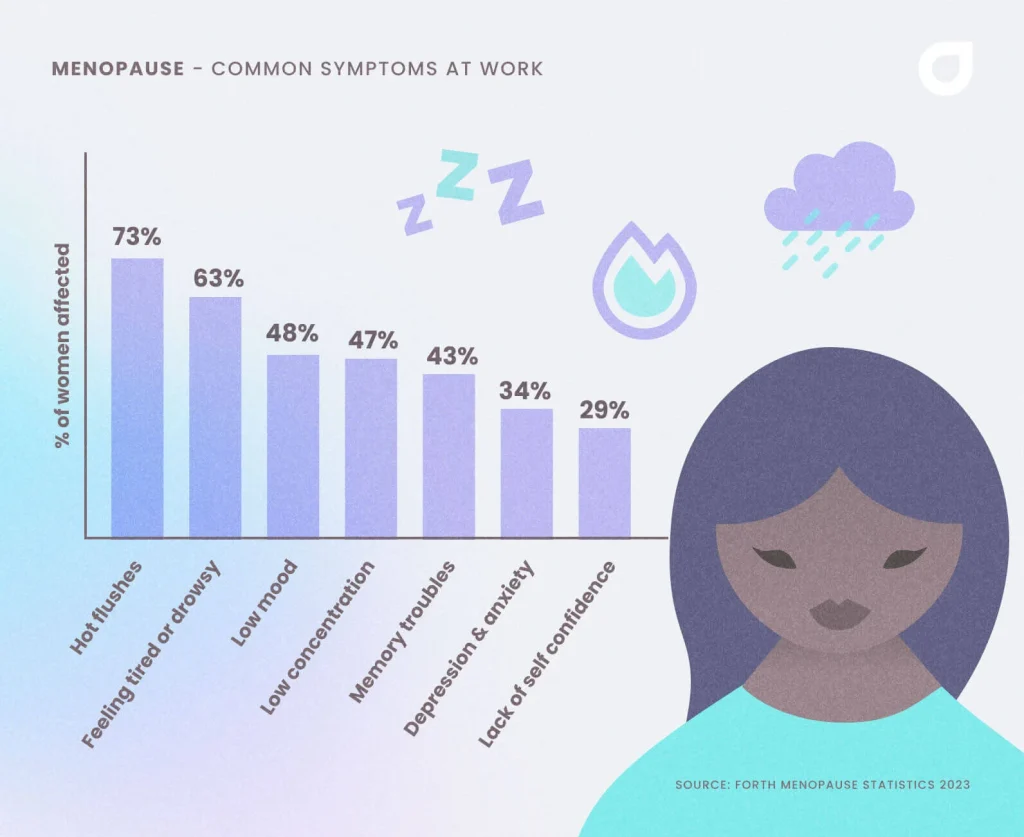
These are all things that can affect a woman’s ability to do her job to the best of her ability and it’s very clear this affects the majority of women going through menopause.
How Are Employers Supporting Women Going Through the Menopause
According to our 2019 statistics, there’s a fundamental lack of support in the workplace. Of the women who responded to that 2019 survey:
- 90% said their employers offer no support
- 5% said their employers offer free advice
- 3% said their workplace has menopause specific policies in place
- 3% said their line managers had received specific training around menopause
What About Perimenopause? What Symptoms Are Women Experiencing?
Perimenopause is the period at which hormones begin to change for women, however, this is typically before your periods stop completely.
It comes with a range of symptoms, some of which can be incredibly challenging.
In July 2023, we surveyed 6,806 women about their experience with perimenopause. The majority (90%) of respondents were aged between 30 and 49 as this is when women are most likely to experience perimenopause.
We found the most commonly experienced symptoms are:
- Mood changes (87%)
- Poor sleep (79%)
- Digestive issues (78%)
But the list of common perimenopause symptoms is much longer than that:
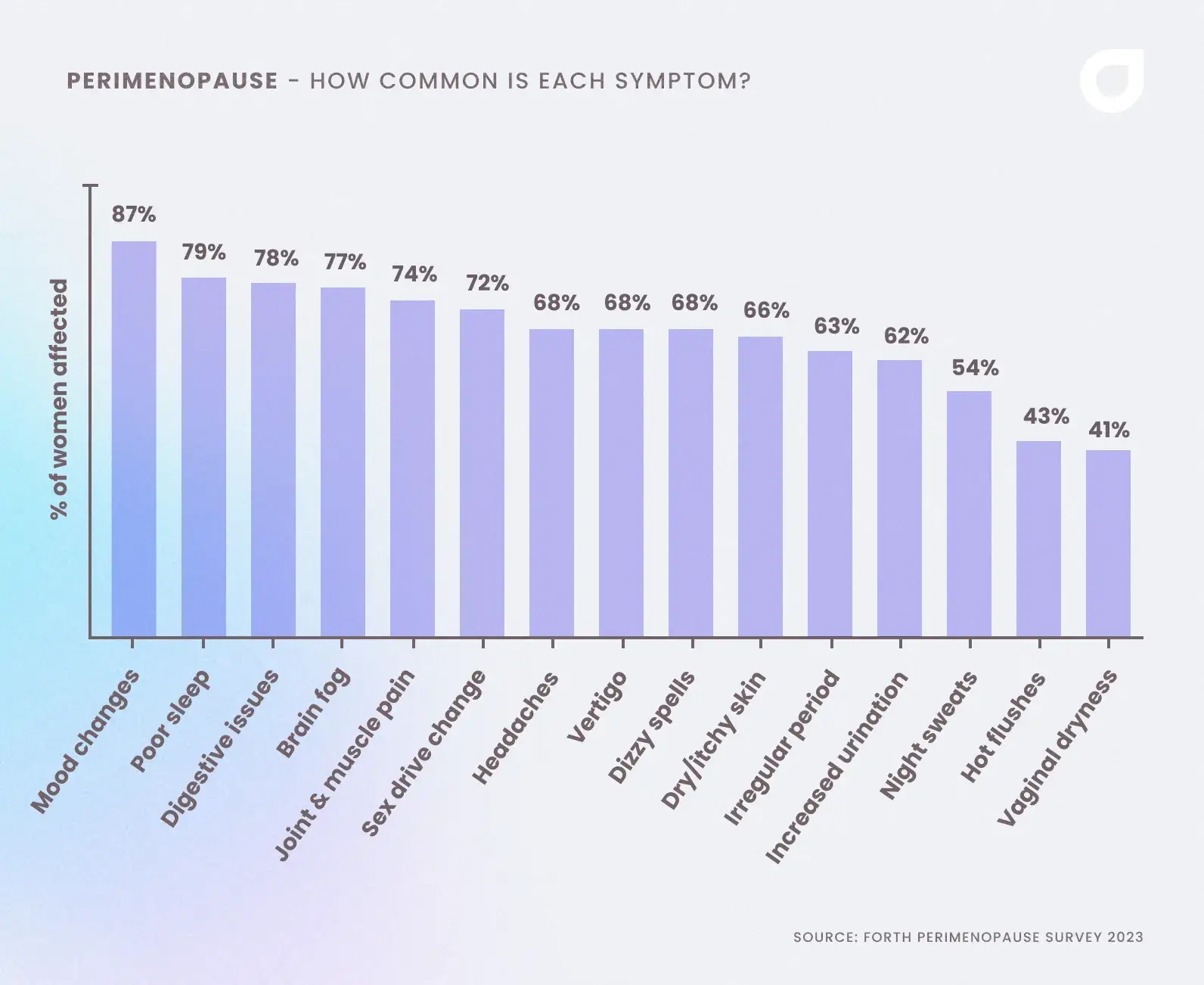
Some of these symptoms can, of course, be caused by other conditions. But the frequency with which perimenopause symptoms are experienced highlights the need for more in depth policies and support for women at work.
HRT Statistics 2023
We also took a look at data from the NHS about the number of prescriptions being issued for various types of HRT. We found:
- The cost to the NHS on HRT prescriptions has risen from £5.8 million in October 2018 to £16.3 million in the most recent month of data available, September 2023. This represents an increase of 181% in the last 5 years
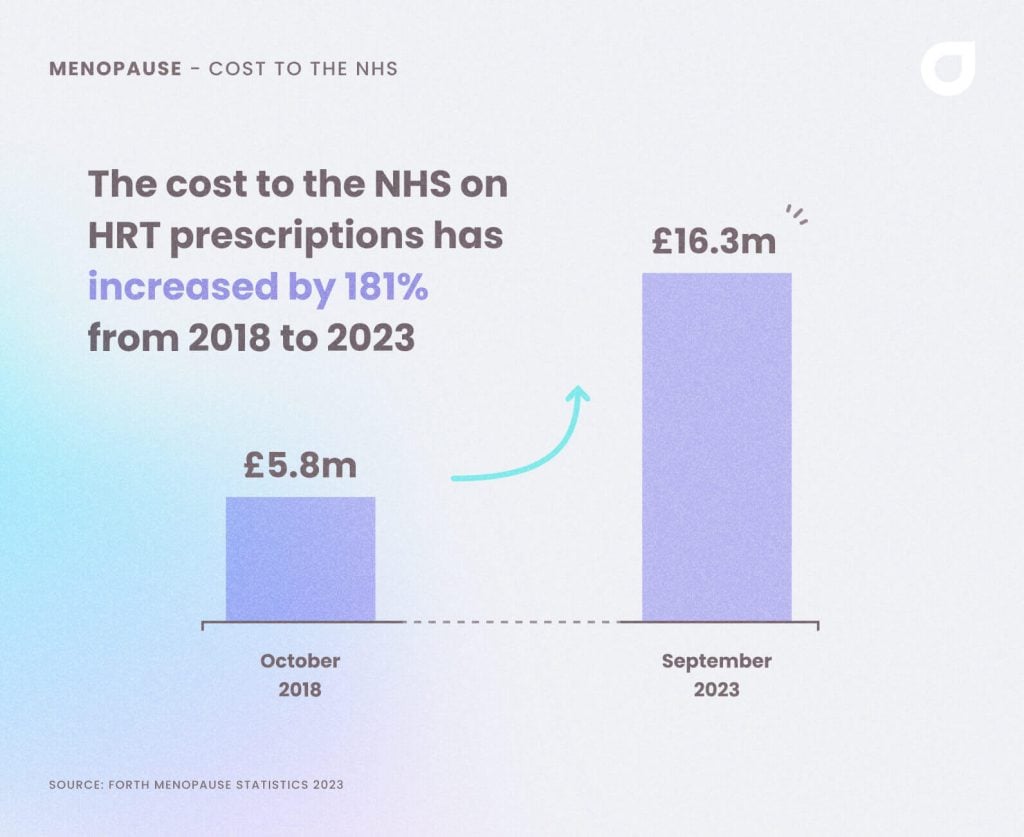
We can see the total spend data below:
| Year | Total Prescriptions | Total Cost |
|---|---|---|
| 2019 | 5,579,714 | £73,370,764 |
| 2020 | 5,764,738 | £73,760,107 |
| 2021 | 7,057,956 | £91,703,198 |
| 2022 | 10,490,442 | £141,952,212 |
| 2023 | 9,770,208 | £138,786,396 |
The £16+ million spent in September 2023 represents over 1.1 million prescriptions being issued for HRT.
We can also break this down regionally. Of course, these regional figures will be influenced by the demographic of the specific region.
| Year | London | North West | East of England | South West | North East and Yorkshire | Midlands | South East | Total |
|---|---|---|---|---|---|---|---|---|
| 2019 | £8,169,549 | £8,863,523 | £8,949,247 | £9,397,785 | £10,228,865 | £13,138,260 | £14,623,533 | £73,370,762 |
| 2020 | £8,110,922 | £8,839,699 | £9,072,733 | £9,685,613 | £10,023,880 | £13,198,534 | £14,828,723 | £73,760,104 |
| 2021 | £9,738,795 | £11,124,662 | £11,346,490 | £11,963,863 | £12,695,748 | £16,499,927 | £18,333,715 | £91,703,200 |
| 2022 | £14,626,914 | £17,567,350 | £17,616,173 | £18,312,837 | £20,342,141 | £25,771,442 | £27,715,357 | £141,952,214 |
| 2023 (to Sept) | £14,226,441 | £17,452,553 | £17,162,313 | £17,884,500 | £20,016,042 | £25,277,568 | £26,766,979 | £138,786,396 |
The fastest growing regions in terms of HRT prescription spending in the NHS (over the period from October 2018 to September 2023) were the South West and North West. And here’s how all regions ranked in terms of the growth in spending for NHS prescriptions on HRT:
- South West (190%)
- North West (187%)
- North East and Yorkshire (183%)
- East of England (182%)
- Midlands (179%)
- South East (174%)
- London (152%)
Resources
- If you’re not sure whether you may be experiencing perimenopause, you can find out with an at home perimenopause blood test here
- If you want to know more about your rights around sick leave, ACAS has useful resources
- For general support and advice around menopause and perimenopause, you’ll find lots of content in our hub.
- The NHS has a list of support resources here.
Methodology and Caveats
We sourced survey data for our attitudes to sick leave survey from an ESOMAR practising market research company who supplied us with a demographically representative panel of people aged over 16 in the UK.
We then cited data from our previous studies as well, the methodologies for which can be found on their respective pages.
Finally, we cited data from the NHS. This is available here.
When sourcing this data, we followed a similar methodology as the NHS themselves did in a 21/22 report and looked at all drugs across 2 categories:
- 6.4.1 – female sex hormones and their modulators
- 7.2.1 – preparations for vaginal and vulval changes
There may be other drugs used in the treatment of the menopause which are not included in these categories (e.g. anxiety related medication for those experiencing anxiety brought about by menopause). However, it is impossible in such categories of medication to know how many were prescribed for symptoms caused by menopause. As such, we maintained a focus on 6.4.1 and 7.2.1 drugs categories.
A Note on the Use of Language
For the purpose of this article, we frequently refer to those experiencing menopause as “female” and “women.” We want to acknowledge our understanding that not all people assigned female at birth retain that gender by the time they reach menopause. And equally we know that women who were assigned male at birth will not undergo menopause.
It is not our intention to exclude anyone or offend in our use of language in this piece.
- Health scores calculated
Close
This information has been medically reviewed by Dr Thom Phillips
Thom works in NHS general practice and has a decade of experience working in both male and female elite sport. He has a background in exercise physiology and has published research into fatigue biomarkers.

Dr Thom Phillips
Head of Clinical Services
Related articles
Like this article? Here are some more based on similar topics.





